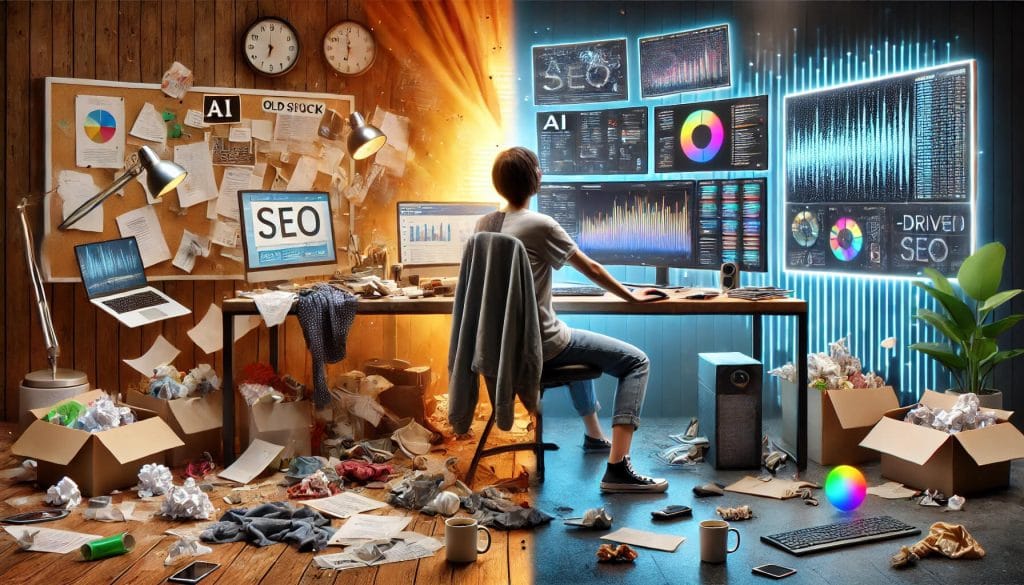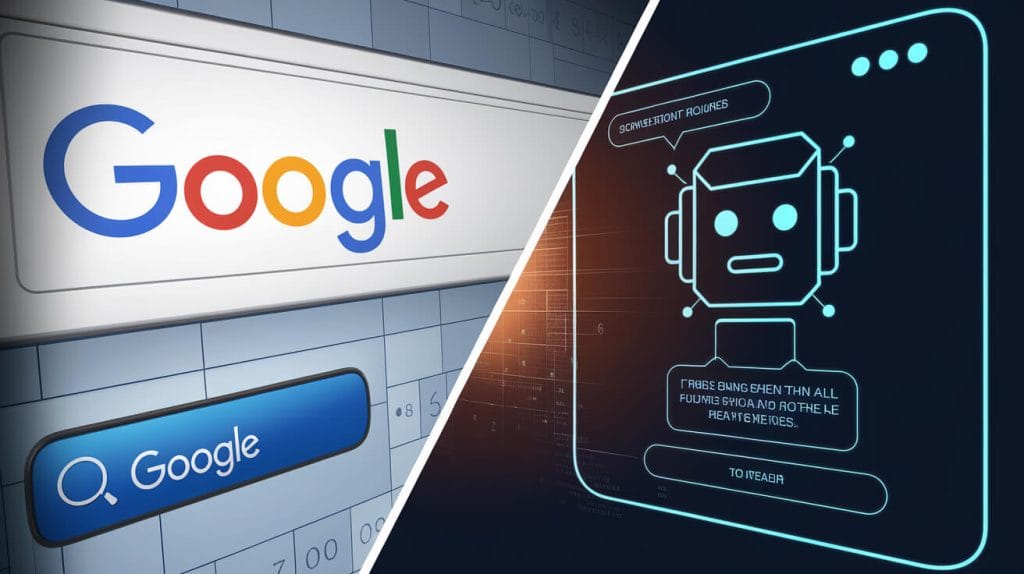It all began with the familiar hum of a Google search bar and found its way through the bustling streets of social media, the quiet corners of AI chatbots, and the vibrant communities of platforms like Reddit and Discord.
By the end of this article, you’ll see just how much our search behavior has transformed—and where it’s headed next.
The Starting Point: Traditional Search Engines
It’s hard to believe, but there was a time when searching for information meant typing a few keywords into Google and hoping for the best. Fast forward to 2025, and while traditional search engines like Google are still a significant player, their dominance is no longer absolute.
According to the data, 61% of people still rely on Google and other traditional search engines for their queries. That’s a solid majority, but it’s a far cry from the near-monopoly they once held.
I remember the days when Google was the go-to for everything—whether I was looking for a recipe, researching a school project, or trying to figure out why my computer was making that weird noise. It was simple, straightforward, and reliable. But as the digital world expanded, so did our options.
Social media platforms began to emerge as powerful search tools, and AI chatbots started to offer personalized, conversational answers. The landscape was shifting, and I couldn’t help but wonder: where would we go next?
The Rise of Social Media Search
If you’re anything like me, you’ve probably found yourself scrolling through Instagram or TikTok, only to stumble upon something that piqued your curiosity. Maybe it was a viral recipe, a trending news story, or a product recommendation. Whatever it was, you didn’t open Google to learn more—you stayed right where you were and searched within the app.
In 2024, social media became a powerhouse, with 77% of people using platforms like Instagram, TikTok, and Facebook to find information. That’s a staggering number, and it’s not hard to see why. Social media offers a more visual, interactive, and community-driven way to search. Instead of sifting through pages of text-based results, you can watch a video, read comments, and even ask questions directly to the person who posted.
I’ve personally found myself relying on social media search more and more. Whether I’m looking for travel recommendations, fashion inspiration, or even career advice, I know I can find real, relatable content from people who’ve been there and done that. It’s like having a global community at your fingertips, ready to share their experiences and insights.
The Emergence of AI Chatbots
Now, let’s talk about the new kid on the block: AI chatbots. In 2025, 30% of people are using AI platforms like ChatGPT to search for information. It’s a smaller percentage compared to traditional search and social media, but it’s growing fast—and for good reason.
AI chatbots offer a completely different search experience. Instead of typing keywords and sifting through links, you can have a conversation. You can ask follow-up questions, clarify your intent, and get personalized answers in real-time. It’s like having a knowledgeable friend who’s always available to help.
I’ll admit, I was skeptical at first. Could an AI really understand what I was looking for? But after a few interactions, I was hooked. Whether I needed help brainstorming ideas for a blog post, troubleshooting a tech issue, or even planning a vacation, the AI was there to guide me. It wasn’t just about finding information—it was about having a dialogue, exploring possibilities, and getting tailored recommendations.
Content Performance: Human vs. AI
As someone who creates content, I’ve always been curious about how human-written and AI-generated content stack up against each other. The data paints a clear picture: human-written content still reigns supreme. In fact, AI content gets 5.44 times less traffic than content created by humans.
At first glance, that might seem surprising. After all, AI has come a long way in terms of generating coherent, relevant, and even creative content. But when you dig deeper, it makes sense. Humanized content has a unique voice, a personal touch, and a depth of understanding that AI can’t quite replicate—at least not yet.
I’ve seen this firsthand in my own work. When I pour my thoughts, experiences, and personality into a piece, it resonates with readers in a way that AI-generated content simply can’t. That’s not to say AI doesn’t have its place—it’s a fantastic tool for brainstorming, drafting, and even optimizing content. But when it comes to connecting with an audience, there’s no substitute for the human touch.
The Growing Impact of Community Platforms
One of the most exciting developments in the world of search is the rise of community platforms like Reddit, Quora, and Discord. These platforms have become go-to destinations for people looking for authentic, real-world advice and insights. And the numbers back it up: community platforms are showing consistent growth in SEO traffic.
I’ve always been a fan of Reddit. There’s something magical about the way strangers come together to share their knowledge, experiences, and opinions. Whether I’m looking for advice on a niche hobby, troubleshooting a tech problem, or just curious about what people think about a trending topic, Reddit has never let me down.
Quora, with its Q&A format, is another gem. It’s like having access to a global panel of experts, each offering their unique perspective on a wide range of topics. And then there’s Discord, which has evolved from a gaming chat platform to a hub for communities of all kinds. From book clubs to coding groups, Discord offers a space for real-time interaction and collaboration.
What’s fascinating is how these platforms are influencing search behavior. Instead of relying solely on traditional search engines, people are turning to communities for answers. It’s a shift that reflects our desire for connection, authenticity, and real-world insights.
Future Trends: What’s Next for Search?
As I look to the future, I can’t help but wonder: where will search take us next? The data points to some exciting trends that are already starting to shape the way we find information.
1. Voice Search on the Rise
Voice search is expected to dominate in the coming years. With the proliferation of smart speakers, voice assistants, and voice-enabled devices, it’s easier than ever to search for information using just your voice. I’ve already started using voice search more often—whether I’m cooking in the kitchen, driving in the car, or just too lazy to type. It’s fast, convenient, and feels like the future.
2. Podcasts vs. Blogs
Another trend to watch is the rise of podcasts. In 2025, there are over 4 million active podcasts, compared to more than 1 billion blogs. While blogs are still a valuable source of information, podcasts offer a more personal, conversational way to consume content. I’ve found myself listening to podcasts more often—whether I’m commuting, working out, or just relaxing at home. It’s a format that fits seamlessly into our busy lives.
3. AI-Enhanced Search Everywhere
Finally, AI-enhanced search is becoming ubiquitous. From personalized recommendations to predictive search, AI is making it easier than ever to find what you’re looking for. I’ve noticed this in my own search behavior—whether I’m shopping online, streaming a movie, or even browsing social media, AI is there, quietly working behind the scenes to enhance my experience.
The Big Picture: A World of Possibilities
As I reflect on the evolution of search behavior, I’m struck by how far we’ve come—and how much further we have to go. From the simplicity of traditional search engines to the richness of social media, the intelligence of AI chatbots, and the authenticity of community platforms, the way we find information has never been more diverse or dynamic.
But perhaps the most exciting part of this journey is the sense of possibility. As technology continues to evolve, so too will our search behavior. Who knows what the future holds? Maybe we’ll be searching for information using virtual reality, or maybe we’ll have AI assistants that anticipate our needs before we even ask.
Whatever the future brings, one thing is certain: the way we search will continue to shape—and be shaped by—the world around us.
And there you have it—a deep dive into the evolution of search behavior in 2025. Whether you’re a content creator, a marketer, or just someone who loves to learn, I hope this journey has given you a new perspective on how we find information—and where we’re headed next. Happy searching!



